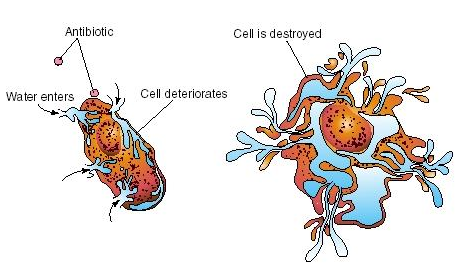 |
 |
| Home | Our Story | Articles | Products | Contact us | Hebrew |
Conditions
Products
|
Antibiotics - Replacements from Nature
Improving Physical Function & Activity
|
| Antibiotics | ||||||||
|
||||||||
|
||||||||
| What are Antibiotics? Germs' Durability How to Decrease the Consumption of Antibiotics? |
||||||||
| My Recommendations | ||||||||
What are Antibiotics? The antibiotics act against the cause of infection, leaving the healing process to our body's immune system. Most antibiotics are produced naturally by fungi, germs or other organisms. Today, synthetic - artificial antibiotic is also produced. The bets known antibiotics today is Penicillin: It is the first antibiotic to be discovered (year 1928). The discoverer of Penicillin, Alexander Fleming, won the Medical Nobel peace prize for his accomplishment. The Antibiotics act against germs in a few different ways, depending of the type of antibiotics: |
||||||||
|
||||||||
|
||||||||
Different types of antibiotics are made for different types of germs. |
||||||||
There exists a specific type of antibiotics that are designated to fight against specific types of germs, and other types of antibiotics that have a wider range – effective against a larger population of germs. Additionally, antibiotics harm the proper microbial function of the body (for example, in the intestine, the vagina, and the skin) by killing groups of harmless organisms and thus contributing to the creation of infections, due to an over growth of durable organisms. |
||||||||
| Germs' Durability | ||||||||
As mentioned, the germs develop a durability against antibiotics. The durability expands and becomes stronger as the use of antibiotics grows and expands. This phenomenon presents quite a big medical challenge, seeing that on the one hand the patient should be treated effectively against a germ infection, yet on the other hand should be given the most basic antibiotics that will not destroy other germs, and will prevent the development of durability against "advanced" antibiotics. It is clear that a work of medical research and development of new antibiotics is required, however the large investment in research and development, compared with the short-ranged life of the antibiotics due to the germs' development of durability reduce the profitability for medical companies to invest in new antibiotics. In fact, in the last decades no new antibiotic has been developed. |
||||||||
|
During the taking of antibiotics: |
||||||||
|
||||||||
| How to Decrease the Consumption of Antibiotics | ||||||||
|
||||||||
| I have found an amazing site with the best offer of "Buy 2 get 3 Free"!!!! or 1+1 with real low prices and very good quality products. | ||||||||
| The below name tabs are direct links to the required product. | ||||||||
To |
||||||||
| Top of Page |
| Home | Our Story | Articles | Products | Contact us | Hebrew |


